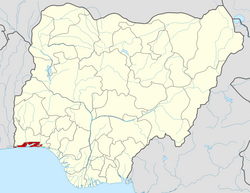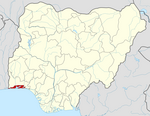This is an old revision of this page, as edited by Filedelinkerbot (talk | contribs) at 01:23, 15 June 2015 (Bot: Removing Commons:File:LagosAirport.jpg (en). It was deleted on Commons by INeverCry (Per Commons:Commons:Deletion requests/File:LagosAirport.jpg).). The present address (URL) is a permanent link to this revision, which may differ significantly from the current revision.
Revision as of 01:23, 15 June 2015 by Filedelinkerbot (talk | contribs) (Bot: Removing Commons:File:LagosAirport.jpg (en). It was deleted on Commons by INeverCry (Per Commons:Commons:Deletion requests/File:LagosAirport.jpg).)(diff) ← Previous revision | Latest revision (diff) | Newer revision → (diff)| This article needs to be updated. Please help update this article to reflect recent events or newly available information. (June 2015) |
| Lagos State | |
|---|---|
| State | |
 Flag Flag | |
 Location of Lagos State in Nigeria Location of Lagos State in Nigeria | |
| Country | |
| Date created | May 27, 1967 |
| Capital | Ikeja |
| Government | |
| • Governor | Akinwumi Ambode (APC) |
| • Senators |
|
| • Representatives | List |
| Area | |
| • Total | 3,577 km (1,381 sq mi) |
| Population | |
| • Total | 21,000,534 |
| • Rank | 2nd of 36 |
| • Density | 5,900/km (15,000/sq mi) |
| GDP (PPP) | |
| • Year | 2014 |
| • Total | $91 billion |
| • Per capita | $4,333 |
| Time zone | UTC+01 (WAT) |
| ISO 3166 code | NG-LA |
| Website | lagosstate.gov.ng |
Lagos State is an administrative division of Nigeria, located in the southwestern part of the country. The smallest in area of Nigeria's states, Lagos State is arguably the most economically important state of the country, containing Lagos, the nation's largest urban area. The actual population total is disputed between the official Nigerian Census of 2006, and a much higher figure claimed by the Lagos State Government. Lagos State is located in the south-western part of the Nigerian Federation. On the North and East it is bounded by Ogun State. In the West it shares boundaries with the Republic of Benin. Behind its southern borders lies the Atlantic Ocean. 22% of its 3,577 km are lagoons and creeks.
History
Early History
Before the Portuguese name of Lagos had been adopted, Lagos' initial name was Eko which referred mainly to the Island. The first to settle in Eko were the Aworis. The Awori hunters and fishermen had originally come from Ile-Ife to the coast. The name Eko comes either from the Yoruba "Oko" (cassava farm) or "Eko" (war camp). Over 650 years ago, the Oba of Bini sent warriors to Eko who were received in a welcoming manner by the residing Awori fishermen. The Bini Prince, Ado, who led the war party, was asked to become their leader. From that point on, Eko belonged to the kingdom of the Oba of Bini.
Postcolonial Era
Lagos State was created on May 27, 1967 by virtue of State (Creation and Transitional Provisions) Decree No. 14 of 1967, which restructured Nigeria’s Federation into 12 states. Prior to this, Lagos Municipality had been administered by the Federal Government through the Federal Ministry of Lagos Affairs as the regional authority, while the Lagos City Council (LCC) governed the City of Lagos. Equally, the metropolitan areas (Colony Province) of Ikeja, Agege, Mushin, Ikorodu, Epe and Badagry were administered by the Western Region. The State took off as an administrative entity on April 11, 1968 with Lagos Island serving the dual role of being the State and Federal Capital. However, with the creation of the Federal Capital Territory of Abuja in 1976, Lagos Island ceased to be the capital of the State which was moved to Ikeja. Equally, with the formal relocation of the seat of the Federal Government to Abuja on 12 December 1991, Lagos Island ceased to be Nigeria’s political capital. Nevertheless, Lagos remains the center of commerce for the country.
Government
Main article: Politics of Lagos StateSince its creation in 1967, the state has been administered either by a governor and a House of Assembly in civilian or quasi-civilian (under Ibrahim Badamasi Babangida's administration) federal administrations, or by Sole-Administrators or Military Administrators in military dispensations . Since December 2007, Yoruba has been the second official language of debate and discussion for the House of Assembly after English.
Administrative Divisions and Local Government Areas
Lagos State is divided into five Administrative Divisions, which are further divided into twenty (20) Local Government Areas, or LGAs. They are:
| LGA Name | Area (km) | Census 2006 population |
Administrative capital | Postal Code |
|---|---|---|---|---|
| Agege | 11 | 459,939 | Agege | 100 |
| Alimosho | 185 | 1,277,714 | Ikotun | 100 |
| Ifako-Ijaye | 27 | 427,878 | Ifako | 100 |
| Ikeja | 46 | 313,196 | Ikeja | 100 |
| Kosofe | 81 | 665,393 | Kosofe | 100 |
| Mushin | 17 | 633,009 | Mushin | 100 |
| Oshodi-Isolo | 45 | 621,509 | Oshodi/Isolo | 100 |
| Shomolu | 12 | 402,673 | Shomolu | 101 |
| Ikeja Division | 424 | 4,801,311 | ||
| Apapa | 27 | 217,362 | Apapa | 101 |
| Eti-Osa | 192 | 287,785 | Ikoyi | 101 |
| Lagos Island | 9 | 209,437 | Lagos Island | 101 |
| Lagos Mainland | 19 | 317,720 | Lagos Mainland | 101 |
| Surulere | 23 | 503,975 | Surulere | 101 |
| Lagos Division | 270 | 1,542,279 | ||
| Ajeromi-Ifelodun | 12 | 684,105 | Ajeromi/Ifelodun | 102 |
| Amuwo-Odofin | 135 | 318,166 | Festac Town | 102 |
| Ojo | 158 | 598,071 | Ojo | 102 |
| Badagry | 441 | 241,093 | Badagry | 103 |
| Badagry Division | 746 | 1,841,435 | ||
| Ikorodu | 394 | 535,619 | Ikorodu | 104 |
| Ikorodu Division | 394 | 535,619 | ||
| Ibeju-Lekki | 455 | 117,481 | Akodo | 105 |
| Epe | 1,185 | 181,409 | Epe | 106 |
| Epe Division | 1,640 | 298,890 | ||
| Total | 3,474 | 9,019,534 | Ikeja |
The first 16 of the above LGAs comprise the statistical area of Metropolitan Lagos. The remaining four LGAs (Badagry, Ikorodu, Ibeju-Lekki and Epe) are within Lagos State but are not part of Metropolitan Lagos.
In 2003, many of the existing 20 LGAs were split for administrative purposes into Local Council Development Areas. These lower-tier administrative units now number 56: Agbado/Oke-Odo, Agboyi/Ketu, Agege, Ajeromi, Alimosho , Apapa, Apapa-Iganmu, Ayobo/Ipaja, Badagry West, Badagry, Bariga, Coker Aguda, Egbe Idimu, Ejigbo, Epe, Eredo, Eti Osa East, Eti Osa West, Iba, Isolo, Imota, Ikoyi, Ibeju, Ifako-Ijaiye, Ifelodun, Igando/Ikotun, Igbogbo/Bayeku, Ijede, Ikeja, Ikorodu North, Ikorodu West, Ikosi Ejinrin, Ikorodu, Ikorodu West, Iru/Victoria Island, Itire Ikate, Kosofe, Lagos Island West, Lagos Island East, Lagos Mainland, Lekki, Mosan/Okunola, Mushin, Odi Olowo/Ojuwoye, Ojo, Ojodu, Ojokoro, Olorunda, Onigbongbo, Oriade, Orile Agege, Oshodi, Oto-Awori, Shomolu, Surulere and Yaba.
List of current Local Government Area Chairmen.
Tertiary Institutions in Lagos State
- University of Lagos
- Lagos state college of health technology
- Lagos State University
- Lagos Business School
- Caleb University
- Yaba College of Technology
- Lagos State Polytechnic
- Pan-African University
- Adeniran Ogunsanya College of. Education
- Lagos city Polytechnic
- Wolex Polytechnic
- St Augustine College of Education, Akoka
- Micheal Otedola College of Education, Epe
- National Open University, Lagos
- Federal College of Education, Akoka
People
While the State is essentially a Yoruba-speaking environment, it is a socio-cultural melting pot attracting both Nigerians and foreigners alike.
Indigenous inhabitants include the Aworis and Eguns in Ikeja and Badagry Divisions respectively, with the Eguns being found mainly in Badagry.
There is also an admixture of other pioneer settlers collectively known as the Ekos.
The indigenes of Ikorodu and Epe Divisions are mainly the Ijebus with pockets of Eko-Awori settlers along the coastland and riverine areas.
Notable people
- Hakeem Olajuwon
- Babatunde Olatunji
- Herbert Macauley
- Henry Rawlingson Carr
- Mobolaji Johnson
- Bola Tinubu
- Babatunde Raji Fashola
- Fela Kuti
- Bruce Onobrakpeya
- Jimi Agbaje
- Femi Ojo Ade
- Funsho Williams
- Henry Ajomale
- Ayodele Awojobi
- Bode George
Transportation
Murtala Mohammed International Airport in Ikeja and is one of Nigeria's 3 major international airports.
See also
References
- See List of Governors of Lagos State for a list of prior governors
- ^ "Lagos State - Population".
- Akinkuotu, Eniola (21 January 2015). "We can double Lagos GDP, says Ambode". The Punch NG. Retrieved 16 March 2015.
- ^ "Lagos State, Nigeria". Retrieved 2014-03-29.
- Nigerian Congress - Administrative Division Description
- "History of Lagos State". Retrieved 2014-03-29.
- "Local Government Areas". Retrieved 2010-03-20.
- http://www.lagosstate.gov.ng/pagemenus.php?p=60&k=32
Further reading
- Ade Adefuye; et al., eds. (1987), History of the peoples of Lagos State, Lagos: Lantern Books, ISBN 9789782281487
{{citation}}: Explicit use of et al. in:|editor=(help) - Ajose, Sunny A. 2010. “The Evolution and Development of Lagos State Administration in Lagos State: A Sociological Approach.”
- Michael Filani (2012), The Changing Face of Lagos: From Vision to Reform and Transformation (PDF), Cities Alliance
External links
- Lagos State Government Official Site
- Lagos Interactive Maps & Sat Navs to travel around.
- Lagos Digital Street Maps.
- Lagos State Community WebSite.
- http://universitiesofnigeria.com/tag/universities-in-lagos-state/
| States of Nigeria | |
|---|---|
| Federal Capital Territory | |
| Governors of Lagos State | |
|---|---|
| Mayors | |
| Governors | |
| Yoruba topics | |||||||||
|---|---|---|---|---|---|---|---|---|---|
| History | |||||||||
| Subgroups | |||||||||
| Yoruboid languages | |||||||||
| Politics | |||||||||
| Geography (Yorubaland) |
| ||||||||
| Demographics | |||||||||
| Culture | |||||||||
| Education & philosophy | |||||||||
| Yoruba Misplaced Pages | |||||||||
